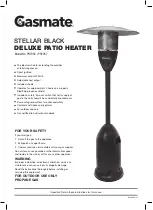
14
76683
Important Safeguards
Although your gas logs are very realistic in appearance it
is not a real wood-burning fireplace and must be used for
burning rejected material.
To avoid irreparable damage to the appliance or personal
injury; matches, paper, garbage or any other material must not
be placed or thrown on top of the logs or into the flames.
To avoid personal injury, do not touch hot surfaces when
the appliance is operating.
Touch only the piezo button and control knob. Avoid contact
with the front screen, canopy or any other part which will be
very hot.
Always ensure that the fireplace screen is in place when
the appliance is operating.
Close supervision is necessary when the appliance is
being operated near children.
Do not use to cook food.
If this is the ONLY gas appliance, we recommend a minimum
200 pound cylinder with a fill gauge. Use of a 100 pound
cylinder is not recommended. Other household gas appliances
may require the tank size to be larger. Do not operate the vent
free fireplace if the fuel level in the propane tank is below 1/4
full.
This appliance is intended to be used only for supplemental
heat. Do not use it routinely as a primary heat source. Continu-
ous operation could produce excessive humidity depending on
construction characteristics and outdoor temperatures (below
200
°
F) Over time, this could cause condensation to form and
damage wall structures and exterior paint. Do not use this
product during building construction. Dust, debris, paint fumes
etc. can cause burner damage and/or produce strong odors.
If the fireplace is equipped with glass doors, the doors must be
fully open when the gas appliance is operating.
WARNING: The glowing ember base and all the logs are
manufactured from bonded ceramic fiber. This is a
commonly used material in industry worldwide. In the
event of the logs and base being removed, care should
be taken not to damage the bonded material.
Intentional misuse of, or deliberately fragmenting, the
material could lead to inhaling fibers and be injurious to
health. Insure the logs are properly positioned at all
times.
Flame Check
A periodic visual check of the flames should be made. The pilot
flame should always be present when the appliance is in
operation. (Fig. 23)
In normal operation (at full rate for approximately 15 minutes)
the following flame appearance should be observed:
Front Blue Flame Burner: The flame should burn blue with
absolute minimal to no yellow flames visible. Height of flame
should be approximately 3” on high.
Rear Yellow Flame Burner: The flame should be yellow in
color and should extend 6 to 8 inches above the large front
logs.
Typical flame shape seen in Figure 24.
NOTE: For your safety, the appliance is equipped with an
oxygen depletion system. The system senses the oxygen in the
atmosphere and switches off the gas supply in case the level of
oxygen falls below a safe level. It must not be altered in any
way.
1
¹⁄₂
"
1
¹⁄₂
"
Natural Gas
Propane
T122
Fig. 23 Pilot flame position and location.
Fig. 24 Correct burner flame appearance.
A
Air Shutter Settings - Dim “A”
Model
Blue Flame
Yellow Flame
Front Burner
Rear Burner
PS24RN
0.250”
Closed
PS24RP
0.500”
0.250”
T134
Fig. 25 Air shutter settings.








































